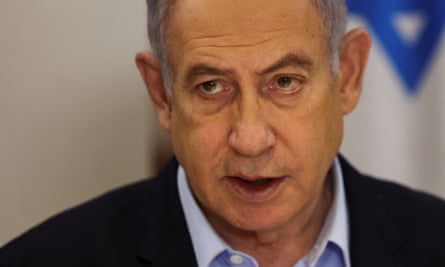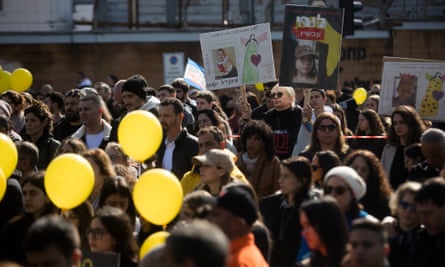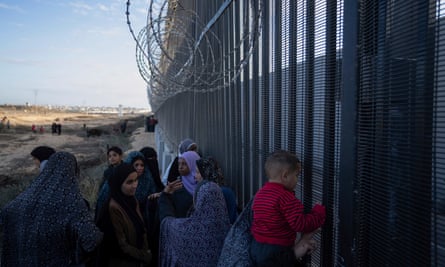Israelis have marked 100 days of war with a 100-minute pause in the working day and rallies to call for the return of hostages held in Gaza, but little relief from the anxiety that has gripped the country since Hamas launched its 7 October attacks.
Many Israelis remain deeply shaken by the incursion, in which 1,200 people, mostly civilians, were killed and 240 taken hostage.
Israel is “in the middle of a terrible dream, and I want to wake up from this terrible dream and create a new Israel”, Arnon Bar-David, the leader of the Histadrut confederation of trade unions, told a mass meeting in Tel Aviv. “We will rebuild everything they have tried to destroy.”
Normal life is returning to the streets of Jerusalem, Tel Aviv and other cities, but many shops and restaurants are still shut and hundreds of thousands of reservists mobilised.
The Israeli prime minister, Benjamin Netanyahu said in a televised address on Saturday that the war against Hamas would continue “until the end, until total victory”.
“We are continuing the war … until we achieve all of our goals: eliminating Hamas, returning all of our hostages and ensuring that Gaza will never again constitute a threat to Israel,” he said.

Analysts and military officials in Israel have said the conflict could continue for many months, even a year. Many Israelis describe a continuing “existential fear”, compounded by the threat of a further war with Hezbollah along the country’s disputed northern border. Two Israelis died when an anti-tank missile possibly fired by Hezbollah hit their home on Sunday.
In Gaza, where Hamas has put up stiff resistance to Israel’s air and ground campaign, the war continued without let up. Israel’s offensive has killed at least 23,968 people, mostly women and children, according to an updated toll from the Palestinian health ministry in Ramallah.
The count does not differentiate between combatants and civilians, but the ministry has said more than two-thirds of the dead are women and children and that the number of wounded has surpassed 60,000. More casualties are thought to be unidentified or buried in the rubble of buildings destroyed by Israel’s bombing and shelling.
Israel has argued that Hamas is responsible for the high civilian casualties, saying its fighters deliberately make use of civilian buildings and launch attacks from densely populated urban areas.
Hamas-run medical authorities in Gaza said on Saturday that 135 Palestinians had been killed in the previous 24 hours.

After an Israeli airstrike before dawn on Saturday, video provided by Gaza’s civil defence department showed rescue workers searching through the twisted rubble of a building by torchlight.
Footage showed them carrying a young girl wrapped in blankets with injuries to her face, and at least two other children appeared dead. A boy covered in dust winced as he was loaded into an ambulance.
The attack on the home in the Daraj neighbourhood of Gaza City killed at least 20 people, according to the civil defence spokesperson Mahmoud Bassal.
Another airstrike near the southern city of Rafah, which is packed with displaced families, killed at least 13 people, including two children.
In Israel, much of the focus was on the hostages that Hamas and Palestine Islamic Jihad, a smaller Gaza faction, continue to hold.
Despite driving rain, thousands attended a 24-hour rally in Tel Aviv demanding the return of more than 130 still held after a truce in November, during which around half were swapped for Palestinian prisoners held in Israeli jails.

“These are 100 days of solitude … fear … horror … hunger … without sleep of struggling to maintain hope,” Moran Stela Yanai, who was released in November, told the rally.
Nitza Corngold, whose son is still held in Gaza, told the crowd that seven of her family members had been abducted and three killed.
“Every day that passes we hear more and more testimonies from returned hostages telling of the difficult conditions they endured in captivity … I appeal to the government, bring the hostages back alive now before it is too late. This must be the first and foremost objective of the war,” she said.
Israel has struggled to reconcile its declared war aims of crushing Hamas and freeing the hostages.
Writing in the mass market newspaper Yedioth Ahronoth last week, the commentator Sima Kadmon said neither objective would be accomplished. “The first objective created unrealistic expectations from the outset, and we must hope we haven’t missed our chance to accomplish the second,” she wrote.
Amos Yadlin, a former head of military intelligence, said ministers’ belief that military pressure would force Hamas to release hostages was valid early in the conflict, but no longer appeared justified.
Netanyahu answered such claims directly in his televised address.
“I have heard commentators in studios who explain: ‘This is not possible. This is not necessary.’ Then I, and you also, say: ‘It is possible, it is necessary and we will do it’,” he said.
He also signalled a potential expansion of Israel’s campaign in Gaza, which has already devastated much of the territory and forced 1.8 million people from their homes.

Over the years of an Israeli-Egyptian blockade, smuggling tunnels under the Egypt-Gaza border were a major supply line for Gaza and Israeli military officials have underlined the importance of cutting these off for weeks. To do that, the Israeli army would have to take control of a narrow strip of territory running the length of Gaza’s border with Egypt, experts have suggested.
“We will not end the war until we close this breach,” Netanyahu said.
There appears little chance of any change in policy in the occupied West Bank, where thousands have been detained amid continual military raids on Palestinian towns and cities. Israel says the harsh measures are necessary to prevent what it calls terrorist attacks.
Since 7 October, 333 Palestinians, including 84 children, have been killed across the occupied West Bank, including East Jerusalem, according to the UN. Israeli security forces have killed 324 people, Israeli settlers eight and one death is attributed to either Israeli forces or settlers. In the same period, five Israelis, including four members of the security forces, were killed in Palestinian attacks.
Netanyahu’s political future depends on convincing voters that he was not personally responsible for the failures preceding the attack by Hamas and that he has achieved his declared war aims.
Tensions between those Israelis who believe the return of the hostages should be the principal goal of the war and those who prioritise the effort to destroy Hamas is reflected in divisions within Israel’s fractious ruling coalition. More than 185 Israeli soldiers have now been killed in the offensive.
